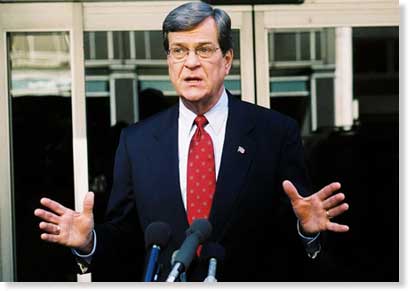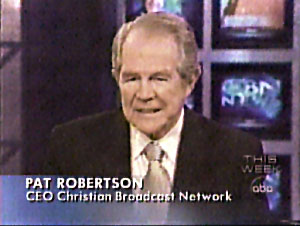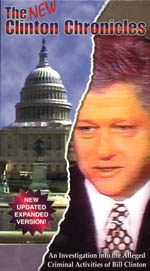
Trent Lott: He had an open alliance with the Southern variant of extremism. |
VIII.
Official Transmitters
The strange thing about watching Trent Lott's slow-motion toppling late last year was that the whole uproar was about something that was not particularly new or unknown about Lott.
Lott's lack of judgment, like that of many Republicans, is embodied in his dalliances with right-wing extremists, which had been well observed previously. In Lott's case, he had an open alliance with the Southern variant of extremism, embodied in the neo-Confederate movement, a band of Southern revivalists who unabashedly argue for modern-day secession by the former Confederate States: "The central idea that drives our organisation is the redemption of our independence as a nation," says the mission statement for the League of the South.
Of course, like most right-wing extremists, they also pathologically hated Bill Clinton: "Impeach Clintigula Now!" shouted a typical banner from a Neo-Confed site. As with their militia brethren elsewhere in the country, the hatred of the former president proved a potent recruiting tool, particularly for making inroads into mainstream conservatism.
Lott contributed a regular column to the neo-Confederate Citizen Informer magazine, usually pontificating on mainstream issues -- while being joined by other columnists who would rant about "Aracial Whites" and discuss the logistics of secession. The Council of Conservative Citizens (CofCC) and other Neo-Confeds have a fondness for Mississippi's senior senator dating back to his efforts to rehabilitate the name and reputation of Jefferson Davis, and the senator in return has lent them both his ear and the air of legitimacy that his name as a columnist gives their magazine. He also told CofCC gatherings that they "stand for the right principles and the right philosophy."
When finally called out on this behavior, amid the counteraccusations that flew during the Clinton impeachment, Lott offered a startlingly misleading denial: "This group harbors views which Senator Lott firmly rejects. He has absolutely no involvement with them either now or in the future." Of course, the questions were about his past.
This all finally caught up with Lott after his now-infamous bout of nostalgia at Strom Thurmond's farewell banquet. But in addition to the collective amnesia that had let Lott slide through beforehand, the really curious thing about the way the Lott matter eventually played out was the compartmentalization of its resolution: All neat and tidy, with no ramifications for anyone else -- including, say, Attorney General John Ashcroft, who has had his own dalliances with neo-Confederates. It had the distinct flavor of a political hit by Team Rove, rather than signifying any sea change on the part of the GOP.
This no doubt serves the purposes of Republican strategists, who are hoping to remake the party's image so that it can finally shake the shadow of the Southern Strategy. But they have to do so carefully without upsetting their Southern base too deeply, and the Bush administration's later attacks on affirmative action, as well as its resurrection of such nominations as Charles Pickering's, may have gone a long way to mollify those voters.
In any case, these strategists are probably not really aiming to make significant inroads into the minority communities, particularly not with blacks. Instead, their obvious target in remaking their image is moderate white suburban voters, whose reluctance to vote Republican is often associated with the GOP's lily-white racial image. But the affirmative-action and other recent moves have made clear that the Bush team is primarily interested in empty symbolic gestures -- like Lott's fall -- to appeal to these voters.
The larger reality is that the Republican Party, and mainstream conservatism generally, has for some time now engaged in such dalliances with extremists across a broad range of issues, and in a number of different sectors and political blocs. Lott was merely the tip of the iceberg.
Lott, and politicians like him, play an important role for right-wing extremists. They are transmitters, figures who straddle both the mainstream and extremist sectors of the right. They help lend such segments as the neo-Confederates a veneer of legitimacy that they otherwise would utterly lack. And they help get their ideas, and ultimately their agendas, into the mainstream.
Let's examine the different kinds of transmitters:
Politicians and public officials
Lott was far from alone among Republicans in maintaining ties to neo-Confederates and other Southern racists. Rep. Bob Barr of Georgia, chief sponsor of a 1997 bill to impeach Clinton, also made appearances before the CofCC, and over the years has had open associations with the populist-right John Birch Society, as well as a striking penchant for placing the militias' issues -- gun control, tearing down the United Nations, fighting "globalism" -- atop his list. Ex-Mississippi Gov. Kirk Fordice maintained open ties with the CofCC and other neo-Confederate factions. And Louisiana Gov. Mike Foster -- who was President Bush's campaign chair in that state -- maintained an interesting relationship with white supremacist David Duke: He liked to buy Duke's mailing lists. (He also tried to conceal his purchase of the lists and was caught and fined for it.)30
The South, however, was only one of many staging grounds for ostensibly mainstream conservative politicians to commingle with right-wing extremists. In fact, it happened in every corner of the country. In New Hampshire, Republican Sen. Bob Smith made open alliances with the Patriot/militia-oriented Constitution Party (indeed, he nearly ran for president on the party's ticket). Former Rep. Helen Chenoweth of Idaho, who chaired a natural-resources subcommittee and was one of the first to join Barr as an impeachment co-sponsor, had long associations with her home district's militiamen -- and you can still buy her anti-environmental video, "America in Crisis," from the Militia of Montana. Former Republican Rep. Steve Stockman of Texas likewise made open alliances with several Texas Patriot groups, and defended their agenda in Congress. Republican Rep. Ron Paul of Texas continues to peddle pseudo-Patriot "New World Order" conspiracy theories to his constituents.
Probably not surprisingly, nearly every single noteworthy transmitter in politics is a conservative Republican. The only exception was ex-Rep. James Traficant, an Ohio Democrat who was recently drummed out of Congress in the wake of his corruption convictions. Traficant trotted out a broad range of Patriot theories and agenda items during his career, but he was a near-total pariah in his own party. (Indeed, before his convictions, Republicans attempted to persuade him to change aisles.)
The spectrum of transmitters also includes a bevy of local and state officials who tread comfortably in multiple universes. Several state legislatures, notably Montana's, have had significant Patriot presences among their ranks, all of them ultraconservative Republicans. And then there was the GOP's 1996 nominee for governor in Washington state: Ellen Craswell, a religious conservative who argued for remaking America as a "Christian nation" and blamed a horrendous January 1993 storm in Seattle on God's wrath for the Clintons' inauguration, which had taken place that day. Craswell later left the GOP to play a prominent role in the pro-militia U.S. Taxpayers Party and its Washington offshoot, the American Heritage Party (both of which later morphed into the Constitution Party), but reportedly has since returned to the fold.
There are also political organizations that often transmit far-right memes in mainstream settings. The most notable of these is the Free Congress Foundation, run by right-wing guru Paul Weyrich, who was one of the architects of the Reagan Revolution, a founder of the Heritage Foundation, and reputedly someone who still enjoys considerable influence even in the current White House. Weyrich's far-right dalliances have been mounting lately, as the Southern Poverty Law Center recently detailed in a scathing report.31
Other groups that transmit far-right memes into mainstream include Larry Pratt's Gun Owners of America, whose connections to the extremist right have been thoroughly documented; Gary Bauer's co-production with James Dobson, the Family Research Council, which spread numerous anti-homosexual memes that originated on the far right; the anti-affirmative action group Center for Individual Rights, which has its origins with the white-supremacist Pioneer Institute, but also has been the "driving force" in the campaign against the University of Michigan's AA program; so-called "Wise Use" groups, which spread anti-environmentalist conspiracy theories into the mainstream; and Operation Rescue (now called Rescue America), which openly consorted with a number of violent anti-abortion extremist groups, and sympathized with their calls for the murder of abortion providers. A complete list of such transmitter organizations, which would include advocacy groups across a broad range of issues, would make even more clear how these groups pick up ideas and themes from extremist organizations and repackage them as mainstream conservative talking points.
Religious figures
Among the leaders of America's religious right, Pat Robertson enjoys a uniquely powerful position, both as overseer of a large broadcasting and evangelical empire, but also as the first fundamentalist Christian leader in recent times to make a significant run for the presidency. He also has a pronounced history of transmitting far-right themes into the mainstream, most especially his frequent claims that America is a "Christian nation," and similar advocacy of installing a theocratic government.

|
| Pat Robertson, appearing on ABC's THIS WEEK |
His most notorious instance of trafficking extremist material came with the publication of his 1992 tome, The New World Order, which of course enjoyed a considerable audience on the extremist right. The book is literally riven with conspiracist allegations and references, including his invocation of the well-known Patriot belief that the Freemason conspiracy is "revealed in the great seal adopted at the founding of the United States."
Two articles -- one by Michael Lind and another by Jacob Heilbrunn -- in the New York Review of Books demonstrated conclusively that the bulk of the concepts in the book were clearly drawn directly from such notorious anti-Semitic works as Nesta Webster's Secret Societies and Subversive Movements and Eustace Mullins' Secrets of the Federal Reserve. What's truly remarkable about Robertson's tactic is that he soft-pedals these well-worn tropes in the cloak of references to "international bankers" and the like, much the same way the Patriot movement cloaks its own conspiracy theories.
Robertson's cohort in right-wing evangelizing, Jerry
Falwell,  likewise
has a history of trotting out far-right themes, including the time he attempted
to demonstrate that the Antichrist was a Jewish man currently alive. Falwell
likewise was closely involved in promoting The
Clinton Chronicles, which spread far-right conspiracy theories
about the former president. Recently, of course, Falwell has again been in
the news, first creating a national uproar by suggesting that gays, and lesbians
and liberals in general were responsible for the Sept. 11 attacks, then creating
an international uproar by proclaiming that Mohammad, Islam's chief prophet,
was a "terrorist."
likewise
has a history of trotting out far-right themes, including the time he attempted
to demonstrate that the Antichrist was a Jewish man currently alive. Falwell
likewise was closely involved in promoting The
Clinton Chronicles, which spread far-right conspiracy theories
about the former president. Recently, of course, Falwell has again been in
the news, first creating a national uproar by suggesting that gays, and lesbians
and liberals in general were responsible for the Sept. 11 attacks, then creating
an international uproar by proclaiming that Mohammad, Islam's chief prophet,
was a "terrorist."
Robertson and Falwell, however, are merely to the religious right what Limbaugh is to the army of imitators who fill the ranks of the rest of talk-radio land. The nation's fundamentalist pastors often play similar roles, repeating themes and ideas that originally circulated among extremists, but presenting them in mainstream contexts which lend them a sudden facade of legitimacy.
Perhaps the most significant sector of these fundamentalists are the Christian Reconstructionists, whose agenda is openly theocratic. Their stated purpose is to install a "Christian" government that draws its legal foundations from Scripture, not the Constitution. Their radical agenda, however, is endorsed by a broad array of conservative politicians, notably by the powerful Council for National Policy, which boasts a membership from across a range of mainstream conservatism, but which in fact was co-founded by R.J. Rushdoony, one of the leading lights of Reconstructionism.
This sector is gaining increasing significance as a meeting-ground for mainstream conservatism and right-wing extremism precisely because of the emphasis being placed on his own fundamentalist beliefs by President Bush. As I'll discuss later, the commingling of the two sectors is occurring at an increasing rate because of this, and it may wind up playing an important role in how the Bush camp responds to criticism of its policies -- particularly its war plans -- and potential threats to its hold on power.
Finally, there are the media transmitters. But they have earned a chapter unto themselves.
Next: IX: Media Transmitters
Footnotes
30. See "Election Turmoil: Purchase of Duke mailing list raises eyebrows," Southern Poverty Law Center Intelligence Report Summer 1999.
31.See "Mainstreaming Hate: A key ally of Christian Right heavyweight Paul Weyrich addresses a major Holocaust denial conference," Southern Poverty Law Center Intelligence Report, Fall 2002.